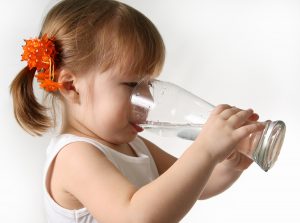Recently a review article came out showing that too much water is not beneficial. Whenever you look around the Internet you find recommendations that you must drink a lot of water to stay hydrated. But the side effect of drinking too much water is a condition called hyponatremia, which can be life threatening. This is so important that a special consensus conference was held in 2015 about hyponatremia.
Not too much and not too little water
Use common sense and stop pumping the body full of water. This dilutes body fluids including your blood and depletes sodium values severely. Let your feeling of thirst be your guide. If you are thirsty, drink water. If you are not thirsty, then wait until you get thirsty and only then drink water. Most people are not performance athletes. The average consumer exercises perhaps up to 1 hour in a gym. Take a bottle of drinking water along and drink from it when you are thirsty. This will prevent dehydration and will protect you from overdoing it and getting hyponatremia.
On the other hand, aging people have to be careful that they use common sense about water intake as their thirst feeling is decreasing with age. This publication shows that aging people lose their natural sense of thirst, which can lead to dehydration.
How much water should I drink a day?
The Mayo Clinic recommends to drink 8 bottles of 8 oz. fluid a day as a rule of thumb. Men need a bit more than women. Men need about 13 cups of fluid a day (about 3 liters) and women 9 cups a day (2.2 liters). These are the total daily beverages, which includes soup, smoothies, tea, coffee and water.
What the recent research paper said is that younger and middle aged people should utilize their sense of thirst. This is how they will decide how much fluid they need in a day. When you age the feeling of thirst is more blunted. Older people need to discipline themselves to get enough fluids.
Conclusion
There is a fine balance between replacing missing water by drinking water and getting over hydrated due to excessive water consumption. It is important to know one’s limits. Usually the feeling of thirst prevents you from getting dehydrated and you should drink water when you feel this way. But older people can get dehydrated as they often lose their sense of thirst with age. When you are younger, thirst can be your guide how much fluid to drink. When you are older common sense has to take over, so you need to discipline yourself to drink enough fluids. This is important, even if the temperatures are lower. But it becomes very important in the warmer season, as we lose more water due to sweating.







